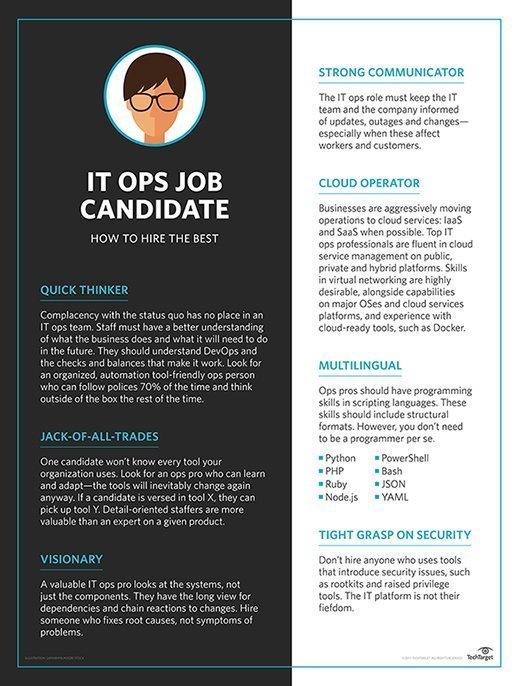
pressmaster - Fotolia
An IT operations job description written for the future
Forward-looking IT ops jobs require more Python and less cable management. To reach valued positions in the IT organization, align your skills with these popular job requirements.
IT operations jobs are never the same from day to day, let alone from year to year.
Today's desirable IT operations job description highlights enterprise cloud use, the looming shadow of security breaches and a DevOps-laced IT productivity focus. This means experienced IT pros who seek high-value jobs can't peddle the same old thing on resumes and LinkedIn profiles.
It was about time security took precedence
In a nonstop news cycle of data breaches, ransomware and extortionware threats, and consumer protection failures, the IT industry must acknowledge the indispensability of security. That means businesses are more willing than ever to pay for IT operations candidates with security expertise.
"We saw an uptick [in demand for security skills] about two years ago, and it's a full-out onslaught now across the board," said Nick Whiteman, director of recruiting for Alpharetta, Ga.-based iSymmetry, which provides consulting and placement for IT organizations in commercial and federal verticals.
Infrastructure and operations professionals should already have learned security skills, said Chris Gardner, analyst at Forrester. Your resume should call out any experience at regulated companies and the aspects of vulnerability management and compliance that you've mastered, he said. Conversely, Gardner sees more security professionals who understand infrastructure, how to code and emerging tools that give security a hands-on role in deployments.
About 40% of iSymmetry's open job requisitions emphasize security, followed closely by DevOps and cloud, Whiteman said.
DevOps in any way, shape or form
IT organizations need DevOps engineers -- those cross-platform jacks-of-all-trades that write code, configure servers and automate everything to go live with one button push. In reality, IT job seekers will discover a lot of different meanings for DevOps titles.
"It can look like a whole lot of different things," said Brandon Birchem, technical recruiter at VanderHouwen, a staffing company that serves technology and other fields in Portland, Ore., and Seattle. DevOps is loosely defined, especially for companies early in their transformation, he said.

IT operations pros who steer their careers toward DevOps should proceed thoughtfully. Everyone wants to be DevOps, but very few people are, Whiteman said. A given DevOps job description might focus heavily on development or operations capabilities, or simply on automation projects. The right candidate for a true DevOps role understands that DevOps is led by the business, managed by development and run by operations, said Clive Longbottom, analyst at Quocirca and TechTarget contributor. While this can be an uphill battle, people with great systems administration backgrounds are willing to set a new path -- and even take a pay cut -- for the right DevOps career.
Since you can't pin down DevOps to one meaning, investigate each IT operations job description thoroughly, Birchem said. Does the company already have a continuous integration/continuous deployment pipeline? Is it hosting workloads on premises or in the cloud? Expect senior-level positions to call for deep experience in scripting languages and across a breadth of tools, he said.
"Everyone who is involved in infrastructure and operations is becoming a developer of some sort," Gardner said. Even if you're not moving to cloud, enterprise-class hardware has become API-addressable and software-defined, which means code -- not rack and stack -- is the path forward. Everything developers have known all along about version-controlled code and automation applies to infrastructure today.
Bash and Python skills are in demand for Linux DevOps shops, as is PowerShell if you're limited to Microsoft systems. Many view Python in particular as a programming and scripting language that can boost administrators and infrastructure-tied positions into more valuable career paths, according to the Skill Up 2017 report from Packt Publishing. For Windows DevOps shops, PowerShell proficiency is a must, as are Microsoft System Center and Azure public cloud skills, said independent technical trainer and TechTarget contributor Timothy Warner.
PowerShell's gains fit well with the trend of multiple OSes in a given IT shop.
"PowerShell hasn't supplanted Bash or anything, but you can run PowerShell on Linux no problem, and you can use Python within PowerShell Desired State Configuration," Gardner said. "Microsoft has put a lot of energy into making sure Linux folks feel comfortable on Azure."
IT operations job descriptions usually cite cloud and DevOps together, so if your career is headed toward DevOps, you're inevitably rising into the clouds. System administrators with Python and Linux experience can transition into DevOps by adding container and cloud experience.
The tools on top resumes
DevOps engineers and other IT ops job roles require Python know-how, but there are many other essential technologies.
The Skill Up report indicates that Git for version control and Docker for containerization are part and parcel to a DevOps role. The nearly 5,000 survey respondents from a range of IT jobs agreed Docker belongs in the top 10 IT tools that they use at work -- it's the number one tool everyone wants to learn. DevOps and cloud engineers favor Ansible and Docker skills, along with Kubernetes. Ansible competitors Chef and Puppet are also associated with higher earnings in systems administration and IT operations roles.
The interview: Advice for job seekers
You've found that perfect listing that's the next step in your career -- time to convince the hiring manager to feel the same way.
Hiring managers write IT operations job descriptions from most to least important responsibilities. Structure your resume and supporting materials to match that linear pattern, so they see the most relevant skills , said VanderHouwen's Birchem. He also recommended job seekers attend public forums and group meetings where people share projects. Referrals also work well.
Once in the interview, Birchem encourages job seekers to show an ability to learn, even if you lack experience in a specific tool -- try to understand the problem that the hiring company wants to solve and relate something you've done that will make their life easier.
For example, if the hiring manager asks how you would monitor outages, answer from a high level that acknowledges business needs and with specific examples, even if they're not based on the company's chosen monitoring platform, said Adam Fowler, an IT operations manager for a law firm in Australia, who also contributes to TechTarget.
"There's no reason why you shouldn't use one of these configuration management tools today," Gardner said. He recommends that IT ops professionals pick up Ruby and YAML, in addition to Python, which will enable them to work on just about any configuration management and automation platform.
Do not necessarily limit yourself to the one IT job description that matches up with your existing tools suite knowledge. Nearly 80% of tech workers can generally choose their preferred tools, according to Skill Up survey respondents. And market consolidation among tool providers is underway, with more expected through 2018, Gardner added, so the tools in use today will change to something -- or disappear entirely -- tomorrow.
You're no robot
Good, practical, efficient IT workers are everything to an organization, but that alone won't improve the business. Regardless of technology trends, corporations always look for individuals who balance strategic, practical and innovative thinking.
"Whether you're talking Agile, DevOps or other [roles], businesses are really searching for ways to improve things," Whiteman said. "The IT setup is just a madhouse."
No matter what IT methodology is in place, the goal should be to accelerate software releases and operate as a synchronized unit within IT and with the business. A higher-level IT operations job requires vision and strategic project management skills -- performance metrics tracking and short- and long-term plans synthesized with the business owner's objectives.
Don't call us; we'll call you
Certain IT operations job titles have gone the way of paper want ads, but skills for those jobs are still relevant.
Demand for network engineers and admins has slowed dramatically as organizations refocus onto infrastructure and cloud security, iSymmetry's Whiteman said. Networking professionals should highlight their ability to monitor traffic for suspicious activity, secure perimeters and stand up firewalls. Other specialized, siloed roles feel the squeeze as well. Virtualization administrators should market their experience handling dynamic, scalable workloads, rather than VMware-specific knowledge.
Birchem also reported a decline in requests for LAMP stack experts. One theory is that open source has moved from a niche in enterprise IT to an assumed option in any deployment. As any DevOps engineer will tell you, Linux, Apache, MySQL, PHP, Python and Perl still command places of at the IT table.
"There are plenty of tech guys who want nothing to do with budgets; they're not going to progress upward," Whiteman said.
Smart IT operations professionals know what major changes in the next 24 months will affect their job, and they know how those changes will accelerate, reshape or harm the business, Longbottom said.
"What you don't want is some individual ops rock star who does get things done 95% of the time, [while] the other 5% of the time, they foul up and there are no records to show what they did or how to recover from the problem," he said.
Meredith Courtemanche is a senior site editor in TechTarget's Data Center and Virtualization group, with sites including SearchITOperations, SearchWindowsServer and SearchExchange. Find her work @DataCenterTT or email her at [email protected].








